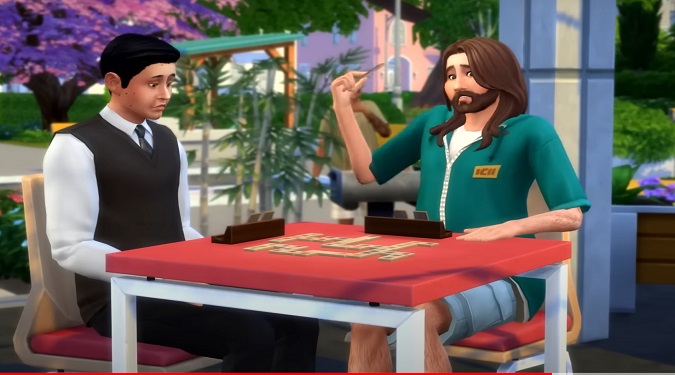The Sims 4 Grow Together expansion pack adds a new Social Compatibility feature that completely changes the way Sims socialize.
Each interaction will feel different depending on how compatible you are with the other Sim.
Thanks to the new system, your Sim will be able to build deeper, more meaningful relationships with family and close friends.
Sims will have completely different attitudes and emotions when interacting with family members, friends, acquaintances, and complete strangers.
These attitude and emotional changes are available in the base game too, but they’re way more noticeable in Growing Together.
They make your family ties grow more complex before your eyes.
How does Social Compatibility work in The Sims 4?
Sims Characteristics and Conversation Topics are the two main pillars of Social Compatibility in The Sims 4. They influence the social compatibility dynamic.
You can find these options under Likes and Dislikes.
Let’s explore how each category works.
Sim Characteristics
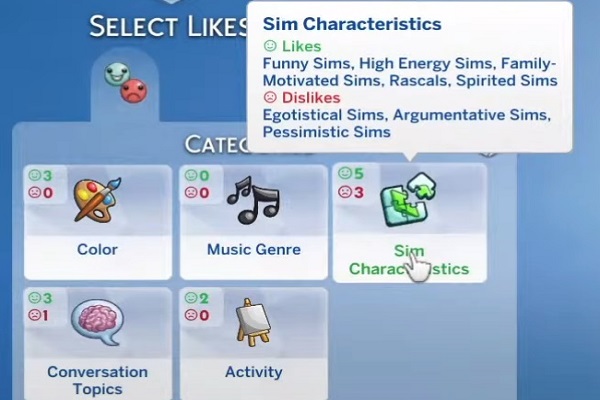
Each Sim Characteristics category represents a grouping of Sims based on a certain archetype.
When your Sim likes one of these categories, they’ll gain a compatibility score with other Sims that fall into that category.
When they dislike that category, they’ll lose compatibility.
When two Sims meet, the game calculates their compatibility score based on both Sims’ characteristics, likes, and dislikes.
Social compatibility is platonic in nature. It doesn’t necessarily involve any romantic consequences.
It’s available for family members, child Sims, and adults alike.
Let’s answer a very important question that’s on your mind.
What makes Sims be in a specific Sim category?
What makes them Cerebral, Ambitionless, or Emotional Decision-Makers?
There are three main things that influence what category your Sims will fall into.
These are their traits, likes and dislikes, and lifestyles from Snowy Espace.
Every new Sim is checked for these three things. The game automatically places them into specific categories based on what it finds.
There are a ton of cross-pack compatibilities. Almost every Sim category has traits from across many different packs.
Pretty much every trait The Sims 4 has released is represented in one of the Sims categories.
For example, the Pet Enthusiasts category is for Sims obsessed with house pets or farm animals. Sims that like animals or pets will gain more social compatibility points when around Pet Enthusiasts.
On the other hand, traits such as Evil will lower another Sim’s compatibility with your Sim.
Homebody Sims prefer to stay home and pursue calm and laid-back activities. They enjoy spending cozy evenings at home, cooking, crafting, gaming, or reading.
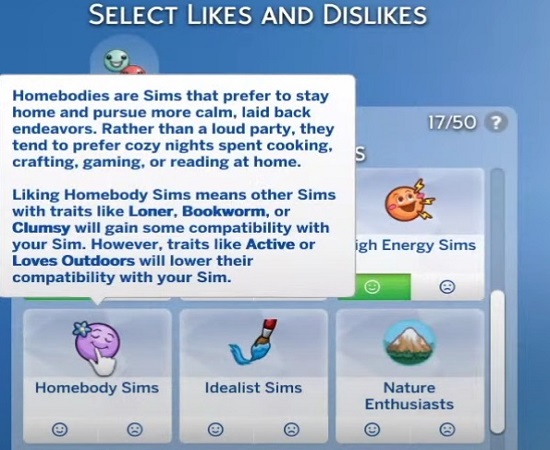
They’ll get along fine with other Sims that have the Loner, Bookwork, or Clumsy traits.
On the other hand, they’ll have a lower compatibility score with Active Sims or Sims that love spending time outdoors.
The Homebody Sim category also includes Socially Awkward Sims from High School Years and Laid Back which is an aspiration trait from Island Living.
It includes cross-pack activities such as baking from Get to Work and knitting from Nifty Knitting and the Sedentary Lifestyle from Snowy Escape.
To make your gameplay more interesting, don’t be afraid to boldly declare your Sim’s dislikes. This will make your gameplay a little more challenging.
EA has upped the Likes and Dislikes count to 50 Likes and Dislikes per Sim.
This means you can add a lot of things to your Sim’s Likes and Dislikes list.
When you’d argue with a Sim, you’d generally get an “I don’t like that” response.
With the new Social Compatibility feature, some Sims really like getting into quarrels. The thought of winning a debate fuels them tremendously.
List of Sim Characteristics in The Sims 4 Growing Together
- Ambitionless
- Cerebral
- Emotional Decision-Maker
- Pet Enthusiasts
- Funny Sims
- High Energy Sims
- Family-Motivated Sims
- Rascals
- Spirited Sims
- Egotistical Sims
- Argumentative Sims
- Pessimistic Sims
- Hard-Working Sims
- Homebody Sims
- Idealist Sims
- Nature Enthusiasts
- Romance Enthusiasts
Conversation Topics
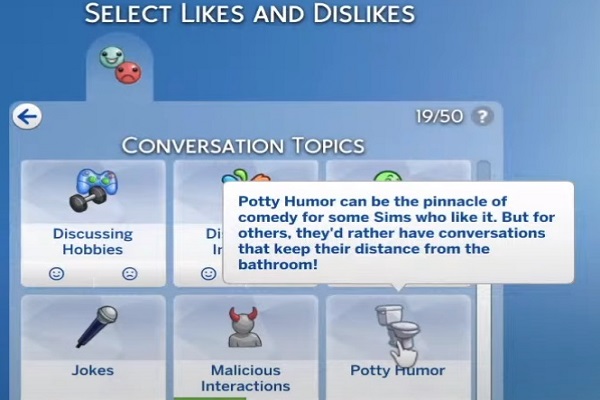
Conversation Topics is the second big pillar of Social Compatibility.
Each of the likes and dislikes in the Conversation Topics category represents whether or not your Sim would prefer other Sims to use those types of interactions on them as the recipient.
This creates a more complex social landscape throughout the game.
If you have Sims that have a really diverse list of Conversation Topics, you really have to learn what each Sim likes and dislikes.
Sims won’t accept interactions that are in categories they dislike.
On the other hand, they’ll gladly accept and open up to interactions they like.
For example, if your Sim dislikes Affection, this means they feel hesitant to accept deep expressions of connection.
If a Sim tries to hug them or hold their hands, 99 percent of the time, they’ll decline that interaction.
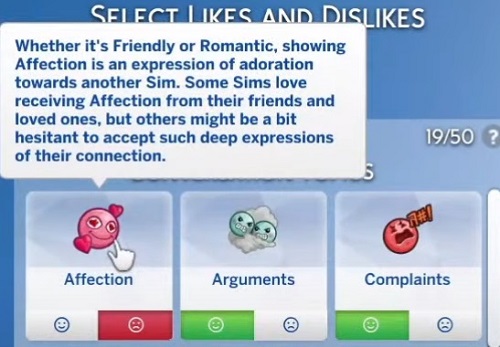
The reason is simple. They don’t like affection.
If your Sim likes Complaints, hearing others whine about life can be really refreshing. They love hearing other Sims complain about their boring lives.
Choose diverse categories of Conversation Topics.
This will make your gameplay more fun and challenging when it comes to making new friends and deepening existing relationships.
List of Conversation Topics in The Sims 4 Growing Together
- Affection
- Arguments
- Complaints
- Compliments
- Deception
- Deep Thoughts
- Discussing Hobbies
- Discussing Interests
- Flirtation
- Gossip
- Pranks
- Malicious Interactions
- Potty Humor
- Jokes
- Silly Behavior
- Small Talk
- Stories
Types of Social Compatibility in The Sims 4
Awful compatibility
Both Sims have a strong dislike for each other’s personality traits. It suggests a significant clash in their characteristics. This may lead to frequent conflicts and negative interactions.
Bad compatibility
One Sim dislikes the personality traits of the other Sim, while the feeling may not be mutual. This can create some tension and occasional disagreements.
Good compatibility
Both Sims like each other’s personality traits. They are likely to get along well, enjoy each other’s company, and have a higher chance of positive interactions.
Amazing compatibility
Both Sims have a strong attraction or fondness for the other based on their characteristics.
Check the Social Compatibility icon
There’s a new social compatibility icon available in your Sim’s relationship panel.
![]()
No icon indicates neutral compatibility.
Puzzles fitting together mean that those two Sims have good or excellent compatibility.
The puzzles floating mean those Sims have bad or really bad social compatibility.
You can check these details by checking the Sim Profile.
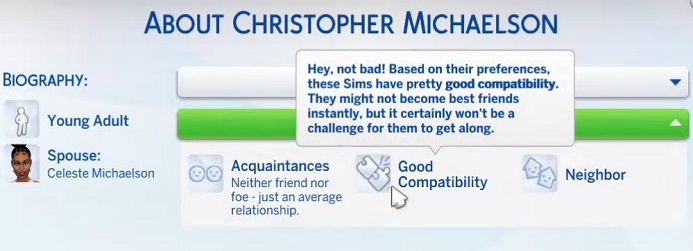
Once again, The Sims 4 automatically calculates the compatibility score between two Sims based on their personal preferences, traits, lifestyles, likes, and dislikes.
When Sims have good compatibility, they’ll become friends much easier.
You’ll be able to level up the Friendship bar much quicker when they’re interacting with each other.
Long story short, it will feel more natural for them to click.
When two Sims have bad compatibility, it will be extremely challenging to have them become friends.
They’ll gain relationship slower and will have a hard time accepting friendly interactions from the other Sim.
The Pie menu reflects Sims Characteristics and Conversation Topics
The Pie menu has been reorganized to reflect the new Sims Characteristics and Conversation Topics categories.
Nearly all the interactions have been categorized to make navigation easier. The Friendly menu has been decluttered and organized into specific interaction categories.
There are several conversation topic preferences that you can choose from such as:
- Affection
- Complaints
- Compliments
- Deep thoughts
- Gossip
- Hobbies
- Interests
Each category of interaction has its own set of options.
For example, the Affection category has the following options for elder Sims:
- Hug
- Best Hug Ever
- Express Admiration
- Cuddle
- Kiss Cheek
- Sneak a Treat
- You are my favorite
There are also new interactions available across different ages.
Once you get passed that learning curve, you’ll love the new interaction categories.
Key interactions such as Break Up, Divorce, Become Best Friends are left uncategorized.
The devs didn’t want Sims to automatically decline that interaction simply because it’s in a category they dislike.
Long story short
Each Sim has their own personal preferences that determine who they are socially compatible with. They’ll be able to instantly build friendships with the Sims they’re socially compatible with.
Sims also have preferences that determine who their sworn enemies are.
Just as in real life, you can’t be friends with everyone. You often have a gut feeling about that when you first meet someone new.
If you don’t like someone, you don’t have to be friends with them.
As your Sims experience different aspects of life, their social compatibility preferences will affect all their relationships and family dynamics.
Here’s how EA describes the social compatibility feature:
Our Growing Together Expansion Pack also includes a new social compatibility feature, which introduces new ways of socializing that will feel different with each Sim, leading to deeper, more meaningful relationships with family and friends.
Maybe specific family members are jokesters together or maybe they are competitive. Watch your Sims’ family grow more complex before your eyes.
Your Sim will now have preferences that determine who they are socially compatible with and who are their sworn enemies!
As your Sim experiences life, there will be opportunities for both drama and unity that will ultimately affect family dynamics and your Sims’ relationships.
Happy Simming!
